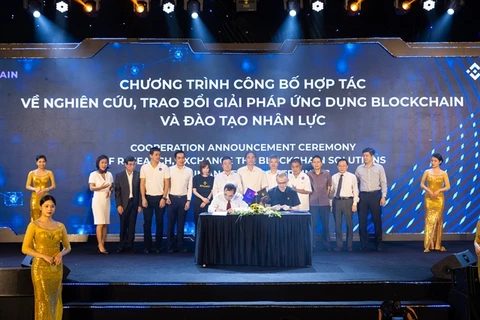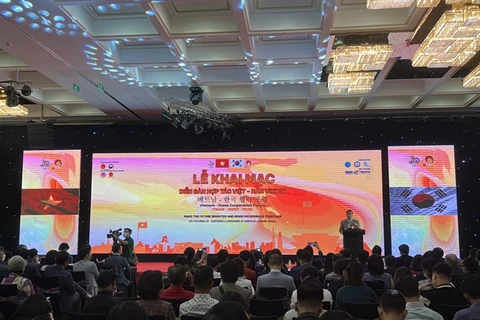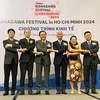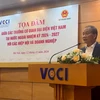Hanoi (VNA) – Representatives from some foreign embassies in Hanoi shared their respective countries’ experience in developing blockchain technology at a workshop held in Hanoi on August 5.
The event was held by the National Assembly’s Committee for External Relations and the Vietnam Blockchain Association with the intention of learning from international experience to complete the legal system, build institutions and policies towards creating a legal corridor for technology-related activities
Vice Chairman of the NA’s Committee for External Relations Nguyen Manh Tien highlighted the great benefits from the use of the blockchain technology, the enormous potential of the technology and its wide application in many fields.
Acting Deputy Ambassador of the US to Vietnam Pamnella Devolder said the US’s policy encourages innovation and investment in blockchain.
She noted that digital money is one of the most popular applications of blockchain, and the US government pays great attention to fighting money laundering, cyber terrorism and cyber fraud. To address those problems, the US has issued regulations on the responsible development of digital assets, and protection of consumers, investors and enterprises, thus ensuring financial stability and reducing risks.
Chargé d'Affaires a.i. at the Swiss Embassy Nicole Wyrsch highlighted principles in the management of this new technology, one of which is to ensure that the legal framework would not hinder technological innovation activities.
Emphasising that the application of blockchain is trans-national, Wyrsch said countries should enhance cooperation to reduce risks and counter all terrorism financing and money laundering activities. She also noted the need for clear regulations on managing crypto-currency.
According to Vice Chairman of the NA’s Committee for External Relations Nguyen Manh Tien, the “playground” of blockchain needs timely orientation and guidance.
He noted that the 13th National Party Congress had laid emphasis on digital transformation and digital economy, with the goal that the digital economy would contribute 20% of the GDP by 2025 and 30% in 2030.
To realise the goal, Tien said experience in digitalisation from other countries and the contribution of enterprises are needed for the building of the legal system regarding to this field./.
The event was held by the National Assembly’s Committee for External Relations and the Vietnam Blockchain Association with the intention of learning from international experience to complete the legal system, build institutions and policies towards creating a legal corridor for technology-related activities
Vice Chairman of the NA’s Committee for External Relations Nguyen Manh Tien highlighted the great benefits from the use of the blockchain technology, the enormous potential of the technology and its wide application in many fields.
Acting Deputy Ambassador of the US to Vietnam Pamnella Devolder said the US’s policy encourages innovation and investment in blockchain.
She noted that digital money is one of the most popular applications of blockchain, and the US government pays great attention to fighting money laundering, cyber terrorism and cyber fraud. To address those problems, the US has issued regulations on the responsible development of digital assets, and protection of consumers, investors and enterprises, thus ensuring financial stability and reducing risks.
Chargé d'Affaires a.i. at the Swiss Embassy Nicole Wyrsch highlighted principles in the management of this new technology, one of which is to ensure that the legal framework would not hinder technological innovation activities.
Emphasising that the application of blockchain is trans-national, Wyrsch said countries should enhance cooperation to reduce risks and counter all terrorism financing and money laundering activities. She also noted the need for clear regulations on managing crypto-currency.
According to Vice Chairman of the NA’s Committee for External Relations Nguyen Manh Tien, the “playground” of blockchain needs timely orientation and guidance.
He noted that the 13th National Party Congress had laid emphasis on digital transformation and digital economy, with the goal that the digital economy would contribute 20% of the GDP by 2025 and 30% in 2030.
To realise the goal, Tien said experience in digitalisation from other countries and the contribution of enterprises are needed for the building of the legal system regarding to this field./.
VNA























